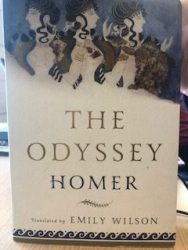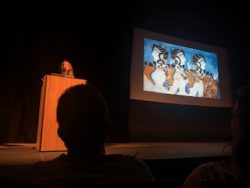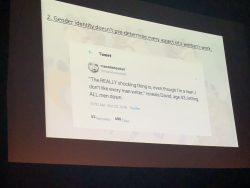Emily Wilson came to Columbia on Thursday night to talk questions translators should consider, her personal journey with The Odyssey, and her current process of translating The Iliad. Bwoggers Chloe Gong and Miyoki Walker were there to hear it all.
 Emily Wilson, a recent recipient of the MacArthur Genius grant, and better known to CC (and some SEAS) students as the translator of Lit Hum reading The Odyssey, gave a thought-provoking lecture Thursday evening at Miller Theater about “Translating the Classics.”
Emily Wilson, a recent recipient of the MacArthur Genius grant, and better known to CC (and some SEAS) students as the translator of Lit Hum reading The Odyssey, gave a thought-provoking lecture Thursday evening at Miller Theater about “Translating the Classics.”
I felt so starstruck when she walked on stage—as a first-year reading ancient Greek epics for the first time, the passages in Lattimore’s Iliad seemed long-winded and overwhelming, but Wilson’s Odyssey was like a refreshing breeze, reminding me of how reading a dense work of literature can also be enjoyable (we stan!). Throughout her lecture, she emphasized the importance of retaining the poem’s simplicity and accessibility, since The Odyssey was originally performed orally for illiterate audiences.
Wilson started the lecture revealing that she’s been interested in The Odyssey since she was eight years old, making her question ideas of community, identity, and home as she grew up. When she was approached with the project, although excited, she was initially unsure of whether she wanted to tackle the epic.
After doing a test-translation of book nine and realizing many previous translators oversimplified the ancient Greek of Homer’s poem using sometimes inaccurate words that mimicked already existing translations, Wilson decided to try it herself.
 Going in, Wilson focused on some essential Homeric elements in The Odyssey. She chose to write in an equivalent meter and limited herself to the same number of lines as the original. Musicality and narrative drive were also important features she wanted to maintain, but above all she wanted the writing to be good.
Going in, Wilson focused on some essential Homeric elements in The Odyssey. She chose to write in an equivalent meter and limited herself to the same number of lines as the original. Musicality and narrative drive were also important features she wanted to maintain, but above all she wanted the writing to be good.
Wilson mentioned that oftentimes in translation, one version is accepted as the only correct interpretation, even if it disregards accurate ancient connotations. With her translation, Wilson wanted to allow for critical readings of the work. She also said that, even though The Odyssey is an ancient poem, the translation didn’t necessarily need to sound ancient.
Although Wilson wanted to maintain solid verbal components and repetition, she also liked mixing the diction up to surprise the reader (some “weird words” she used include ossifrage, scalawag, and canapés). Wilson then showed a painting of Heracles at a crossroads between virtue and pleasure, stating that it was not a good model for translation. You can have a translation that’s both authentic and pleasurable.
One question Wilson says translators must ask themselves when approaching a text is “what truths am I going to tell?” Recognizing her truths, she believes that The Odyssey is a story about Nostos, or homecoming (as we’ve all heard a million times in Lit Hum), but it’s also about all of the Nostos that didn’t happen, the people who never made it home.
Wilson finds it reductive to bring her gender into every conversation about her work but also recognizes how important different perspectives are. The person you are changes the questions you’re able to ask about the text. Unlike many of her predecessors, Wilson did not want to impose modern patriarchal ideals on an ancient poem.
 Expanding on her perspective as a female translator, Wilson mentioned that news articles LOVE to focus on her gender, despite no male translator ever being asked to share their “perspective as a male translator.” The discrepancy between media coverage of male and female translators indicates the societal prejudice and struggles female Homerists face when trying to get their work validated and published. She mentioned the “Smurfette principle” (the images of blue people on her Powerpoint slide got a few chuckles from the audience), the mindset in media that we only need one woman—in a field teeming with men—to represent the perspective of an entire gender.
Expanding on her perspective as a female translator, Wilson mentioned that news articles LOVE to focus on her gender, despite no male translator ever being asked to share their “perspective as a male translator.” The discrepancy between media coverage of male and female translators indicates the societal prejudice and struggles female Homerists face when trying to get their work validated and published. She mentioned the “Smurfette principle” (the images of blue people on her Powerpoint slide got a few chuckles from the audience), the mindset in media that we only need one woman—in a field teeming with men—to represent the perspective of an entire gender.
After stressing that every female translator’s perspective is different, she shared how her personal experiences as a woman helped her better represent the sexism in ancient Greece’s patriarchal society. In the murder of the slave women scene, the women are compared to birds who are caught in a trap. Many other translators reduced the women’s humanity by representing them as birds in death (“feet fluttering”). Wilson however, doesn’t shy away from making the main protagonists look misogynistic and cruel, and portrays the slave women as human beings (“feet twitching”).
Wilson also urged the audience to recognize and celebrate other women translators—contrary to popular belief, she is “NOT the first woman to publish a translation of the Odyssey,” according to her twitter bio. She is the first woman to translate it into English, but many women who came before her have translated the work into other languages.
Shocking the audience, Wilson finished off her lecture with a powerful reading of the first few lines in her own translation of The Iliad, giving a sneak peek of what she has in store for the future. Maybe future Lit Hum students won’t have to suffer through Lattimore’s translation like I did!
Some noteworthy moments during the Q&A portion of the lecture:
-Several Lit Hum students and professors asked insightful questions.
-A strange Greek elder mansplained the pronunciation of a Greek word.
-Wilson requested that the last two questions come from women.
Make sure to follow Emily Wilson on Twitter @EmilyRCWilson and check out her interesting threads on her translation process, potential updates about The Iliad, and occasional photos of her cats!
photos via Bwogger Miyoki
illustration from Pope’s Odyssey via Flickr


 5 Comments
5 Comments
5 Comments
@Anonymous I’d think a Greek person would have a pretty good idea of how to pronounce a Greek word but go off i guess
@Anonymous Modern Greek is highkey phonologically different from Ancient Greek, so being a fluent speaker of the former guarantees no real expertise in the latter. ijs
@Anonymous The lecture literally began by highlighting the GS students that take LitHum, the least you could do in your article is acknowledge their existence instead of SEAS, which never came up.
@anon Think of the Wilson version as a kind of adaptation, like Madeline Miller’s novels Circe and Song of Achilles. As a translation, it’s riddled with questionable choices and omissions (which do, indeed, make it a fast read).
@anon Think of her translation as an adaptation, like Madeline Miller’s “Circe” or “Song of Achilles.” As a translation of Homer, it’s riddled with very questionable choices.